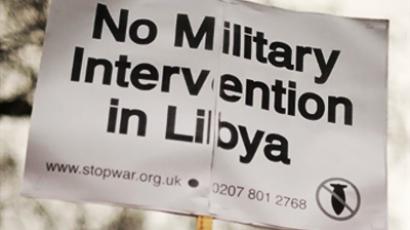Frustration with government grows among Britons

The British Prime Minister announced that the UK will increase the number of Tornado jets deployed to Libya, bringing the total to 12.
This comes on the same day as the Defense Ministry announced the first round of armed forces layoffs as part of budget cuts.The intervention in Libya is leaving people in the UK increasingly angry with the government.
Winter of discontent becoming a seething spring
British streets have been regularly filling with massive anti-government protests which start peacefully, but routinely turn violent.Their fury is over deep spending cuts by a coalition government they say no one wants – and now, a new foreign war.Is the UK’s famed democracy – which it is so keen to export – really that democratic a system of government?“I do not think they are listening to anyone at the moment,” said one critic of the government. “They are just making up their own mind about everything really. We do not have a say in anything whatsoever.”“I do not see that the government will do anything about this – like they did not do anything about the tuition fees, either,” said another government critic. “I have come today because I work in social care – I find it ridiculous how much money they are spending in Libya at the moment, sending planes over, and taking money away from us – they should be spending more money at home.”But the will of these people is one which lawmakers willingly ignore. While a TV news poll suggested 43 percent of people oppose military intervention in Libya, their elected MPs voted overwhelmingly in favor: 557 to just 13 against.“What we’ve got in the House of Commons is a political class – they all go to the same schools, get the same jobs in research, spend their lives in politics and have never had a job in the real world. So when it comes to it, they all vote like sheep,” said Nigel Farage, an MEP from the UK Independent Party.“We do not have enough independent thinkers sitting in the House of Commence preparing to think of counterarguments.”
A world apart from public mandate
The British do not directly choose their prime ministers – certainly not the most-recent men at Number 10.Gordon Brown was handed the job when Tony Blair quit, drawing his eventual successor’s wrath. David Cameron was only rescued from a minority government with a deal of his own – sharing power with the party that voters put third.It is a coalition which an angry electorate sees breaking promises – and which listens to Washington more than Westminster protesters.“The politicians are so committed to this semi-fantasy of the special relationship with Washington that they are prepared to do whatever is necessary to maintain that relationship while having no concern for the relationship with the people who elected them in the first place,” said Chris Nineham from the Stop the War Coalition.“It is a dysfunction, a deep, deep dysfunction of British so-called democracy.”The past six months have seen a series of demonstrations in London and across the UK which culminated in hundreds of thousands of people gathering on Saturday to protest against cuts to public spending and the war in Libya.













